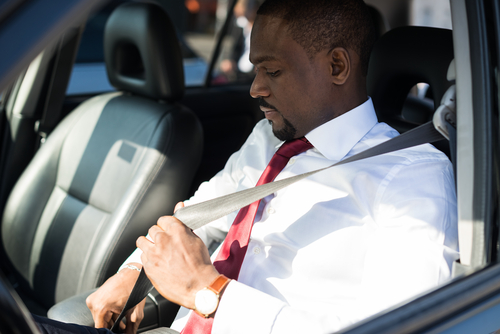Rise in Vehicle Deaths Prompts New Seat Belt Push
August 16, 2021

The rise in motor vehicle fatalities last year, caused in part by the failure of many drivers and passengers to wear seat belts, is motivating traffic safety advocates and government leaders to push for measures to help increase seat belt use.
Increase in Unbelted Accident Deaths and Injuries in 2020
According to preliminary data from the National Highway Traffic Safety Administration, over 38,000 traffic fatalities occurred in 2020, representing a 7% increase in fatality rates from 2019 even though vehicle miles driven plummeted by 13% due to the COVID-19 pandemic and related stay-at-home orders and business restrictions. The figures show that about half of all traffic fatalities in 2020 involved someone who was not wearing their seat belt, representing a 15% increase from the number of fatalities of unbelted drivers and passengers in 2019. The number of traffic fatalities in 2020 where a vehicle occupant was ejected increased by 20% compared to 2019.
Effectiveness of Seat Belt Promotional Efforts Has Plateaued in Recent Years
Beginning in the 1980s, traffic safety advocacy groups have been running public campaigns to encourage people to wear seat belts when riding in a vehicle. In combination with state laws that made failing to wear seat belts a finable offense, seat belt use jumped from around 50% in 1990 to over 90% in 2020. However, the growth rate in seat belt adoption has plateaued in recent years, so traffic safety advocates have begun to look for new ways to continue to encourage seat belt use and reach universal adoption.
States Begin to Adopt Public Campaigns Stricter Seat Belt Laws
In 20 states, failing to wear a seat belt is a primary offense, meaning that a police officer can pull a vehicle over if the officer sees someone in the vehicle not wearing a seat belt. Twenty-nine other states have weaker seat belt laws, including allowing adults not to wear seat belts under certain circumstances. In nine states, failing to wear a seat belt is a secondary offense, meaning that a driver can only be ticketed for not wearing a seat belt or having a passenger not wearing a seat belt if the police officer has pulled the driver over for another traffic offense such as speeding. New Hampshire remains the last state to not have a seat belt law for adults, and also has the lowest rate of seat belt use at 71%. All states require seat belt use for children.
To increase seat belt use, Colorado, which has a secondary seat belt law for front passengers, has started a public awareness campaign using a combination of light-hearted marketing as well as more serious advertisements showing individuals who have suffered serious permanent injuries in accidents in which they were not belted.
Connecticut Governor Ned Lamont recently signed a bill that imposes a secondary seat belt law for backseat passengers. The state already has a primary seat belt law, which has led to the state’s seat belt use rate of about 94%. Massachusetts Governor Charlie Baker has called on the legislature to pass a bill changing the state’s seat belt law from secondary to primary enforcement in an attempt to increase Massachusetts’ seat belt use rate from its current 82%. Only time will tell what changes occur in the state of Pennsylvania.
Contact a Pittsburgh Personal Injury Lawyer to Discuss Your Car Accident Case in Pennsylvania
Did you or a loved one sustain serious injuries due to a car accident in Pennsylvania? Don’t let the medical bills pile up while you wait for the negligent party or their insurance company to do the right thing. Right now, you need an aggressive personal injury attorney on your side, fighting to get you the compensation you need, want, and deserve. The skilled attorneys at Goodrich & Geist, P.C. represent clients injured because of car accidents in Pittsburgh and the surrounding Western PA counties. Call (412) 766-1455 or fill out our online contact form to schedule a consultation about your case. We have an office conveniently located at 3634 California Ave., Pittsburgh, PA 15212. Home visits can be arranged in certain situations.
The articles on this blog are for informative purposes only and are no substitute for legal advice or an attorney-client relationship. If you are seeking legal advice, please contact our law firm directly.

